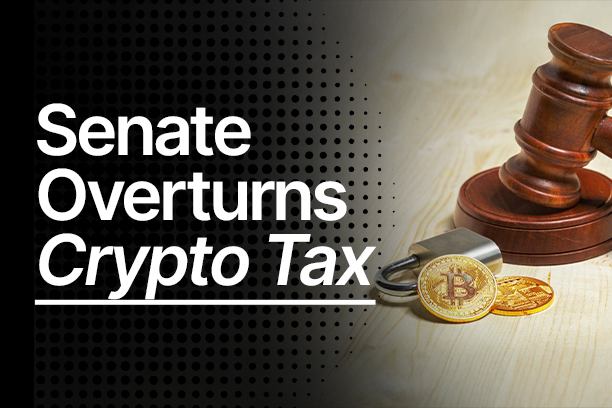Crypto investors and businesses have pushed back against strict tax reporting rules for years—but now, the U.S. Senate has stepped in. In a landmark decision, lawmakers have overturned Biden-era regulations that many in the industry saw as excessive and restrictive.
This victory is expected to ease compliance burdens, giving exchanges, investors, and businesses more room to operate and innovate in the ever-evolving crypto space.
During the CoinRock Show, Matthias broke down the implications of this ruling, calling it a “much-needed course correction” that signals a pro-crypto shift in US policy.
What Was the Biden-Era Crypto Tax Rule?
The tax rule that was just overturned was originally part of the 2021 Infrastructure Investment and Jobs Act. It required crypto exchanges, wallet providers, and other platforms to report all transactions over $10,000 to the IRS.
The goal was to boost tax compliance and crack down on illegal activities, but the rule quickly became controversial. Critics argued it was too vague, too broad, and unfair to crypto users. Decentralized platforms, which don’t have traditional brokers or centralized control, would have struggled to comply, creating major headaches for the industry.
Matthias highlighted this flaw, stating:
“Regulating crypto the same way as banks without understanding how it works is a recipe for failure. You can’t fit Web3 into a Web2 rulebook.”
Why Did the Senate Overturn It?
The Senate’s decision to overturn the crypto tax reporting rule came down to a mix of political, industry, and economic factors.
One of the biggest reasons was the growing bipartisan support for crypto, with lawmakers from both sides recognizing its economic potential. Instead of enforcing strict regulations that could slow down growth, there’s now a push to encourage innovation while still keeping compliance in check.
Pressure from the crypto industry also played a key role. Companies, legal experts, and lobbyists have argued for years that the rule was unrealistic—especially for decentralized platforms that don’t have traditional brokers.
The original tax rule, introduced in the 2021 Infrastructure Investment and Jobs Act, would have forced crypto businesses to track and report transactions they had no real way of monitoring. This led to strong opposition from major crypto firms, who lobbied hard for its removal.
Another factor in the decision is Trump’s pro-crypto stance. His administration has taken a friendlier approach to digital assets compared to the tighter regulations seen under Biden.
With Trump’s influence, regulators are shifting away from restrictive policies and moving toward a more balanced strategy that supports both compliance and industry growth. Overturning this tax rule could mark a turning point in U.S. crypto policy, creating a more favorable environment for investors and businesses alike.
How Does This Impact Crypto Investors?
This decision comes with several key benefits for both retail and institutional investors:
Clearer Rules – Removing the tax rule means fewer complicated reporting requirements, making it easier to buy, sell, and hold crypto without worrying about excessive red tape.
Stronger Market Confidence – Many see this as a positive shift toward more crypto-friendly policies in the U.S., which could help boost trust and stability in the market.
More Institutional Interest – With fewer tax-related hurdles and the promise of clearer regulations, big investors may be more willing to put their money into crypto.
Matthias emphasized the long-term significance of this move:
“Crypto isn’t just here to stay—it’s evolving. And when lawmakers finally start seeing its potential rather than fighting it, that’s when real adoption begins.”
What’s Next?
The ruling is a step in the right direction, but there’s still a long road ahead. While the crypto industry has won this battle, it remains to be seen how future regulations will shape the US crypto landscape. Many expect further clarifications on taxation, stablecoin regulations, and a possible digital asset framework in the coming months.
As the 2024 presidential elections approach, crypto is becoming a hot political topic, with candidates recognizing its role in the future of finance. If this ruling is any indication, the US government is shifting towards a more open and balanced approach to crypto regulation—something investors and industry leaders have been waiting for.
Final Thoughts
The Senate’s decision to overturn the Biden-era crypto tax rule is a significant win for the industry, showing that crypto is gaining stronger political support. While challenges remain, this move sets a positive precedent for future regulations, making the US a more attractive hub for blockchain innovation.
For now, crypto investors can breathe a sigh of relief—regulatory clarity is coming, and it’s looking a lot more favorable than before.





